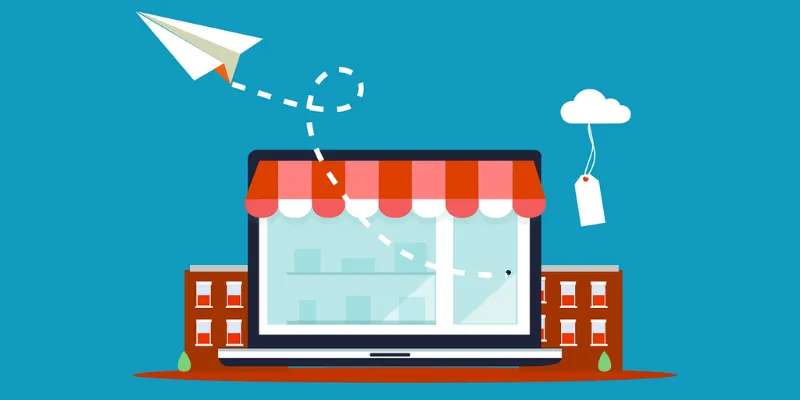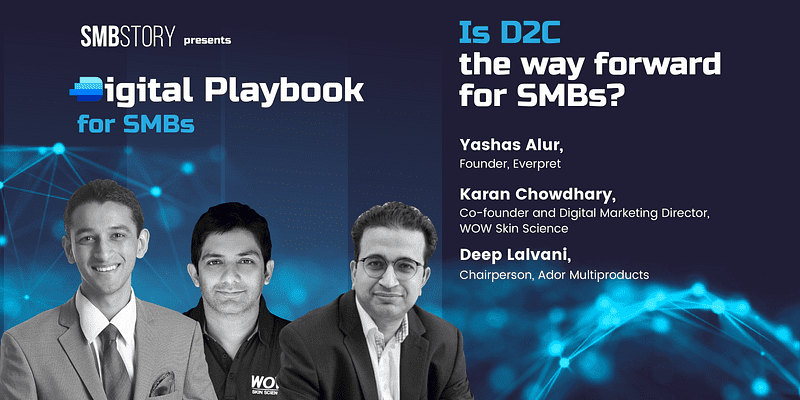#DigitalPlaybook: Is D2C business model the way forward for SMBs?
This week’s episode of Digital Playbook for SMBs saw three entrepreneurs coming together to discuss the rise of D2C and how COVID-19 proved that this model is here to stay.
COVID-19, which brought the entire world to a standstill, also pushed businesses in India and across the world to hit the reset button. The pandemic brought two major realisations to MSMEs — the need to connect more closely with consumers, and the need to go online at all costs.
In this week’s episode of Digital Playbook for SMBs, three distinguished entrepreneurs come together to discuss the rise of the D2C business model and how COVID-19 has proven that it is here to stay.
SMBStory’s Digital Playbook for SMBs is a video series that covers crucial areas of SMB digitisation. It explores digital payments, ecommerce, digital bookkeeping, cloud, security, CRM, automation, AI/ML, blockchain, and other software solutions, products, and emergent technologies.

What is D2C?
The D2C or direct-to-consumer model is a type of business in which the manufacturer is able to directly sell to its customers with the help of an ecommerce strategy.
In a traditional business model, multiple middlemen are present between the buyer and the seller like wholesaler, distributor and retailer.
In the D2C model, these middlemen are eliminated and the seller can directly sell to the buyer through an offline or an online store. In India, online marketplaces like Amazon, , , etc., have played a significant role in amplifying the D2C sector.
India has also seen a steady rise in the number of D2C brands across categories such as FMCG, apparel, and consumer electronics, among others, with brands such as , , , , and many more.
The rise of D2C in India
Karan Chowdhary, Co-founder and Digital Marketing Director of WOW Skin Science, a prominent D2C brand in the FMCG market, says that this trend can be attributed to the power of the internet. “Marketplaces like Amazon and Flipkart have disrupted the way of doing business,” he explains.
Deep Lalvani, Chairperson of Ador Multiproducts, adds that the current times are such that companies need a model wherein they can connect with their customers directly and take their feedback. Ador Multiproducts, a 100-year-old company, recently made a partial shift to D2C with its online venture Sublime Life.
Why companies are choosing D2C over the traditional model
Yashas Alur, Founder of , a women's-focussed accessories brand, says that setting up a D2C business involves a lot of ease and comfort, compared to setting up an offline business wherein several aspects have to be taken care of — supply chain, logistics, distributors, and vendors, among others.
Deep adds that another advantage of the D2C model is its cost-effectiveness and that middlemen between the buyer and seller get eliminated. “The gross margins are very good in a D2C model,” he says.
According to Karan, getting listed on marketplaces also reduces the cost of customer acquisition. He also agrees that this model is becoming a norm but slightly disagrees on the gross margins factor. “D2C is not so profitable for us. That is why building an omnichannel D2C brand is important” he adds.

(L-R) Karan Chowdhary, Co-founder & Digital Marketing Director, WOW Skin Science, Yashas Alur, Founder, Everpret and Deep Lalvani, Chairperson, Ador Multiproducts
How can you build a D2C brand?
All three panellists unanimously agree that focussing on the product, and constantly working on improving and innovating it is the only way to establish a sizable D2C brand.
“There is no particular rulebook when it comes to building a D2C brand. However, I always say that if your product is not good, you will not land up anywhere,” says Karan.
He lists some do’s and don’ts while building one’s own website — such as making sure that images on the website are limited, the website shouldn’t take too long to load, making the communication with the customer straightforward, and most importantly, ensuring customers get a satisfying experience on visiting the website.
Marketplaces versus website
D2C works primarily vial two channels — either a company sells through its own website or through online marketplaces such as Amazon and Flipkart.
The panellists agree that selling through websites increases customer engagement whereas selling through marketplaces increases brand visibility.
Yashas says that developing your own website is equally important. He explains, “We are available on Amazon for visibility. However, our own website and social media platforms help us connect with our customers and create a community, which is not possible in the case of marketplaces."
Edited by Saheli Sen Gupta










